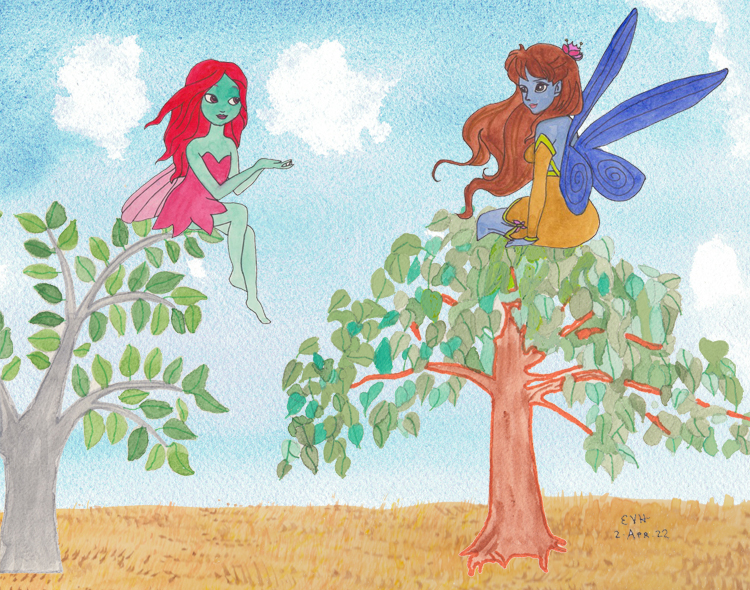
Jataka 311
Pucimanda Jātaka
The Neem Tree
as told by Eric Van Horn
originally translated by H.T. Francis and R.A. Neil, Cambridge University
originally edited by Professor Edward Byles Cowell, Cambridge University
This story features two types of trees and their spirits. The star is the neem tree. The neem tree is also called the “nim” or “margosa” tree. The other tree is the bodhi tree, which—of course—was the type of tree under which the Buddha awakened.
“Robber, arise.” The Master told this story about the venerable Moggallāna while he was living in the Bamboo Grove (Veluvana).
When that elder was living near Rājagaha in a forest hut, a certain robber, after breaking into a house in a suburban village, fled with his hands full of plunder until he came within the vicinity of the elder’s cell. Thinking that he would be safe there, he lay down at the entrance of his hut of leaves. The elder noticed him lying there, and suspecting his character, he said to himself, “It would be wrong for me to have any dealings with a robber.” So he came out of his hut and told the robber not to lie there, and drove him away.
The robber fled with the greatest haste. And men with torches in their hands, following close upon the robber’s track, came and saw the various spots marked by the presence of the robber. They said, “The robber came this way. Here is where he stood. There is where he sat down. And that is the way he fled. He is no longer here.” So they rushed about here and there, but at last they had to return without finding him.
On the next day early in the morning the elder went on his alms round in Rājagaha. When he came back from his pilgrimage, he went to the Bamboo Grove and told the Master what had happened. The Master said, “You are not the only one, Moggallāna, to suspect in a case in which suspicion is justified. Wise men of old suspected in the same way.” And at the request of the elder he told him this story from the past.
Once upon a time when Brahmadatta was reigning in Benares, the Bodhisatta was reborn as a neem tree spirit in a cemetery of that city. Now one day a robber—having just committed act of theft in an outlying hamlet of the city—entered the cemetery grove. And at this time two old trees stood there, a neem tree and a bodhi tree. The robber placed his stolen goods at the foot of this neem tree and lay down there.
Now in these days robbers who were caught were tortured by being impaled on a stake of the neem tree. So the spirit of the neem tree thought, “If people come and capture this robber, they will cut off a branch and make a stake from this neem tree and impale him on it. And in that case the tree will be destroyed. So I will drive the fellow away.” Then addressing him, he repeated the first stanza:
Robber, arise! Why do you sleep? For slumber ’tis no time,
The King’s men are on you, the avengers of your crime.
Then he added these words, “Be gone, before the King’s men take you.” In this way he frightened the robber away. And no sooner had he fled than the deity of the bodhi tree repeated the second stanza:
And even if this robber bold red-handed they should take,
To you, O neem tree, woodland sprite, what difference would it make?
The deity of the neem tree on hearing this uttered the third stanza:
O bodhi tree, you know not the secret of my fear.
I would not have the King’s men find that wicked robber here.
They from my sacred tree, I know, straightway a branch would take,
And to requite the guilty wretch, impale him on a stake.

Figure: “you know not the secret of my fear”
And while the two woodland deities were thus conversing together, the owners of the property, following on the trail of the robber and with torches in their hand, saw the place where he had been lying down. They said, “Lo! the robber has just risen up and fled from this place. We have not got him yet, but if we do, we will come back and either impale him at the foot of this neem tree or hang him from one of its branches.”
And with these words, they rushed about here and there. But not finding the robber, they made off. And on hearing what they said the spirit of the bodhi tree uttered the fourth stanza
Beware a danger yet unseen; suspect before too late.
The wise even in this present world look to a future state.
The Master, when he had brought this lesson to an end, identified the birth: “At that time Sāriputta was the spirit of the bodhi tree, and I was the neem tree spirit.”
